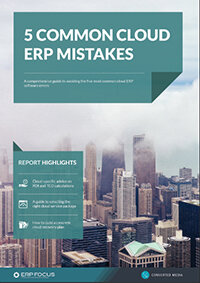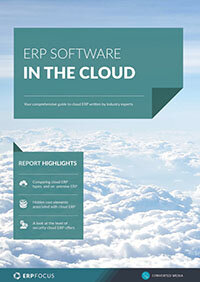Cloud ERP: Is It Right For You?
A loaded question is one that sounds like it should have a simple “yes” or “no” answer, but has built in complexity that makes a simple answer impossible. The classic example of a loaded question is “Have you stopped beating your wife yet?” I would propose another example of a loaded question is: “Is cloud computing the right solution for my ERP application?” Cloud computing, you’ll recall, describes the hosting of a software application by an external vendor on their server (also referred to as Software as a Service, or SaaS).
Understand Your Risk Profile
The reason the question above is a loaded question is that the answer has almost nothing to do with your ERP solution, and everything to do with your company’s size, your company’s culture, and your company’s tolerance for risk. These intangibles play such a critical role because from a financial perspective this is not a make-or-break decision (you may save money with a cloud ERP solution, but not enough to drastically impact the income statement). But strategically, if things go badly, (your cloud ERP vendor goes under, your cloud ERP vendor shuts you down because of a dispute, you cannot get at your business data) the results are catastrophic.
Is it as Easy as Large v Small?
So who would take that risk on cloud ERP? Certainly, small companies or startups without existing IT infrastructures would be good candidates. With a cloud ERP solution they can avoid large up- front capital expenditures, cloud ERP implementations typically can be completed in less time than internal ones, their solution is scalable as they grow, and monthly costs are predictable, resulting in better cash flow management. Cloud computing also offers the advantage of anytime/anywhere access; you don’t need a communications infrastructure to get your computer through the corporate firewall for an ERP connection.
Large companies, and companies with a long evolution of legacy and ERP applications are probably less likely candidates. For them, the cost of IT as a percent of revenue is not sufficient to make cloud computing a compelling financial win, when weighed against the sunk costs of existing hardware infrastructure and purchased software. Large companies are also more sensitive to auditor’s requirements around security, disaster recovery and data integrity. Demonstrating control in these areas becomes harder when the responsibility is outsourced. In general, larger companies feel more comfortable when they have control.
The small/large division is by no means a black-and-white separation; you can find large companies who have moved to cloud ERP, and you can find small ones who choose to keep things internal. The point of indifference for the decision is reached when cost savings are exactly balanced by your level of trust in the service provider.
Over time it is possible the rules of thumb for choosing a cloud ERP solution will become clearer. But one thing is certain – at some point your C-level will be asking you about cloud computing. You’d be well advised to start educating yourself to the risk level for your company.
Featured white papers
-

Five common cloud ERP mistakes
Get your comprehensive guide to avoiding the five most common cloud ERP errors
Download -

Related articles
-

Why you shouldn't underestimate cloud ERP consultant costs
Make sure to take the cost of a consultant into account when planning your cloud ERP budget
-

CMMC Compliance: What Aerospace and Defense Manufacturers Need to Know
Key insights on CMMC compliance, deadlines, and securing DoD contracts with CMMC 2.0 certificatio...
-

Cloud ERP vs on-premise ERP: an objective comparison
Are you choosing between cloud ERP and on-premise ERP? This balanced guide will help

